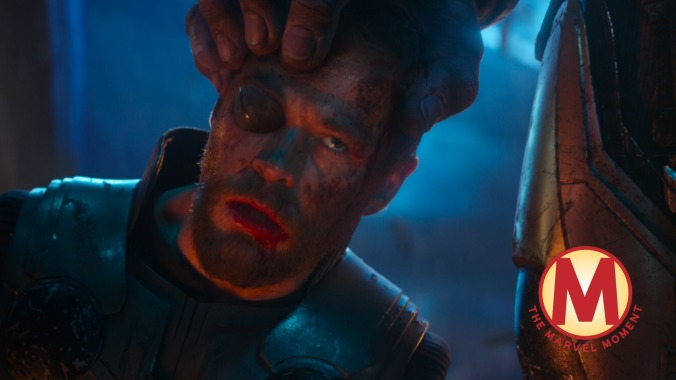Yes, the ending of Infinity War is brutal—but so is the beginning


The obvious scene to highlight from last summer’s Avengers: Infinity War is, of course, its haunting and unforgettable ending—the moment when all hope is lost, evaporating like ash in the wind. But hasn’t that downer denouement been talked to death? What’s left to say, really, about the snap heard ’round the universe? These impossibly bleak closing minutes do not count as the only significant scene in Marvel’s most crowded crossover blockbuster. There’s also, for example, the impossibly bleak opening minutes, when the studio announces that all bets are off—that its 10-year franchise plan will culminate with a real body count. In more ways than one, this first scene sets the tone and the stage, preparing audiences for what Infinity War has in store.
Notably, directors Joe and Anthony Russo, working as usual from a script by Christopher Markus and Stephen McFeely, do not kick things off with a big battle scene. Instead, the film commences with the tinny crackle of a mayday broadcast, before cutting immediately to the aftermath of a massacre: the Asgardian fleet in ruins, decimated by the franchise’s long-teased über–villain, Thanos (Josh Brolin). If previous cameos by the mad titan didn’t really make him seem that intimidating, Infinity War promptly rectifies that. In short order, we watch him manhandle a defeated Thor (Chris Hemsworth), clobber the Hulk in a fistfight, skewer gatekeeper Heimdall (Idris Elba), and choke the life out of Loki (Tom Hiddleston). It’s a lot of death and destruction for the first five minutes of an all-ages, all-hands-on-deck superhero bonanza. The stakes are properly raised. The odds are officially stacked against Earth’s mightiest heroes.
Beyond the sheer grimness, what stands out about Infinity War’s (very) cold open is how little exposition it provides. Were this the season finale of a TV series—and increasingly, that’s what the Marvel storytelling style resembles, albeit on a scale even HBO couldn’t afford—it’d probably begin with a very long “Previously on…” (Were it a comic, we’d get a few asterisks, directing curious readers to pertinent back issues.) The Russos, however, just plunge us right into the action, never bothering to explain, for example, what the entire population of Asgard is doing floating through the cosmos—either you saw Thor: Ragnarok or you’re lost in space. Likewise, the whole emotional bent of the scene depends on understanding these relationships; when Loki has a change of heart watching Thanos laser-beam his brother’s face—sadistic glee giving way to distress—it’s a reflection of nearly a decade of onscreen sibling rivalry. Even the trash talk arguably demands footnotes: Hiddleston’s one-time bad cues the Hulk’s big entrance with a callback to the first Avengers.
The refusal to offer anything like a recap is a matter of necessity. Infinity War has so much ground to cover, geographically and narratively speaking, that it just doesn’t have the time to catch anyone up on what they may have missed. That’s been true, in a sense, of every Avengers movie—the previously two (or three, if you count Civil War, which you probably should) assumed an offhand familiarity with the solo movies that fed into them. Here, that principle is simply compounded by the sheer number of predecessors: As the 19th sequential entry in this forever franchise—a cinematic universe expanding as rapidly as the real one—Infinity War really does feel like a new kind of blockbuster, a super sequel that’s all payoff, no setup. Whether that’s a promising direction for Hollywood storytelling to take is a matter of perspective. But there’s little denying that pulling an ensemble cast of characters from other hit movies is a foolproof way to earn the investment of the initiated. Because watching a bunch of superheroes bite the dust—or disappear into it—only really hurts if you’ve spent a few movies and years getting to know them.